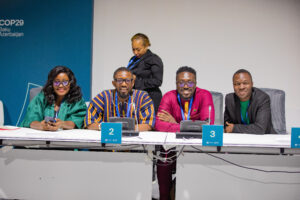An article to commensurate International Women’s Day Celebration 2024.
Women are essential in every field. In spite of a changing environment, women and girls make up more than half of the world’s population and are working hard to support themselves. Although everyone is impacted by climate change, not everyone is equally affected. The effects of climate change are most noticeable to women and children. Inequity and marginalization due to poor income, low gender, low ethnicity, and other social, economic, and political variables increase vulnerability to climate change. According to the UN report on climate change in 2022, women and girls are critical stakeholders in the fight against climate change as they are both groups that are being affected yet have great potential to champion climate action. In Africa, especially Ghana, women are seen to champion diverse climate initiatives ranging from mitigation, adaptation, and technology to building a resilient ecosystem. The AWDF’s 2023 – 2033 Strategic Framework listed key women organizations championing climate actions, notably the Alliance for Women’s Initiative (AFAWI), Songtaba, Abantu, and many more. Women even face more vulnerabilities as their active involvement and leadership in climate change and governance continue to be limited. Today is International Women’s Day, a day designated to celebrate all women for their incredible relevance in the world, Green Growth Africa takes a moment to share a few reflections and recommendations on how women’s resilience in the fight against climate change can be championed.
Greenwashing gender; unpacking tokenism in women’s Climate Leadership.
Despite greater governmental promises to support gender equality, women continue to be marginalized in climate leadership roles. There is still a glaring underrepresentation of women in important climate decision-making roles, even in spite of a slight increase in the proportion of women in national delegations at international treaties from 30 to 38% between 2009 and 2021 and a slight increase in the proportion of female heads of delegations in the Conference of Parties from 10 to 13% during the same period (UNFCCC Secretariat, 2021). These numbers show a worrying trend: rather than being respected for their knowledge and viewpoints, women are frequently included in climate debates only to meet quotas. Even while women have shown themselves to be capable leaders in their communities when it comes to addressing and mitigating the negative effects of climate change, structural obstacles still stand in the way of their meaningful engagement at higher levels. According to the World Economic Forum, closing the gender gap globally will take an additional 132 years. This emphasizes how critical it is to raise the proportion of women in leadership positions in order to advance gender equality and take use of their special skills and insights while tackling serious global issues like climate change.

Empower women; Elevate an entire generation.
In Ghana, women have shown effective leadership in their communities through various initiatives that help address and adapt to the adverse impacts of climate change. We want to celebrate the contributions of some of these women, including Mrs. Roselyn Fosuah Adjei, the Director of Climate Change at Ghana’s Forestry Commission, who has played a significant role in Ghana’s REDD+. We also recognize Mrs. Angelina Mensah of Ghana’s Environmental Protection Agency (EPA), who has successfully negotiated policies on behalf of Ghana for over two decades, and other women such as Nana Asantewa Afadzinu (WACSI), Dr. Portia Adade (CSIR), Dr. Andelina Mensah (UG), among others, who continue to advance climate actions through research, development, and innovation.
Green Growth Africa believes that more women can make a positive impact within the climate and sustainability sphere, and we therefore recommend the following to facilitate women’s resilience in climate leadership:
1. Governments should design and implement policies and avenues to alleviate gendered constraints and build women’s resilience capacities in climate advocacies, diplomacy, and negotiations in line with Sustainable Development Goals.
2. Funding should be readily available to support women to champion the change they want to see.
Columnists:
Candy Darkwa,
Allan Amoako-Gyedu,
Sandra Bempomaa
(caddarkwa@gmail.com), (allan@greengrowthafricanetwork.org), (sandra@greengrowthafricanetwork.org)



